Are WordPress Translation Plugins Good for SEO or Spammy?
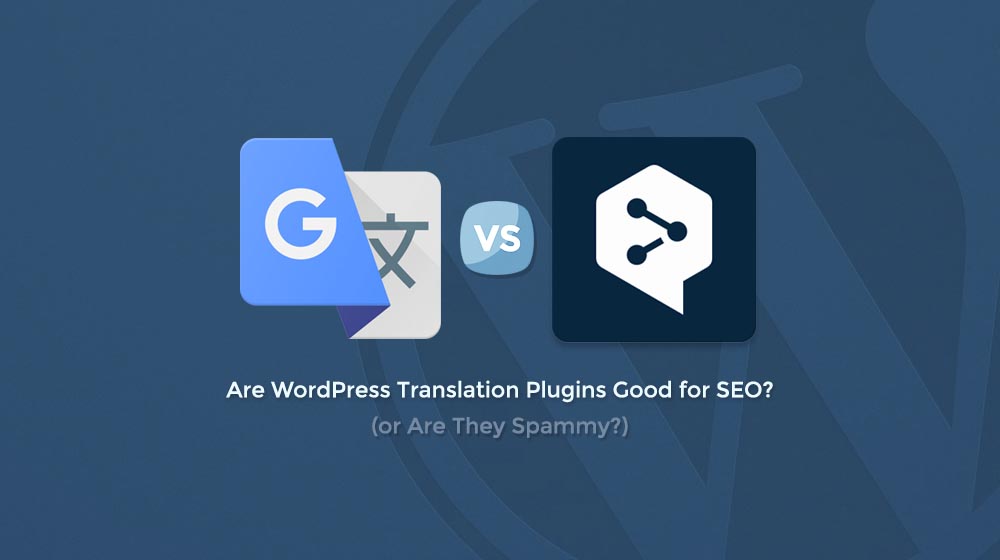
With the vast world of marketing out there, it's easy to get laser-focused on your specific area of expertise. You may often think about other audiences further afield, but reject them for being too far outside of your comfort zone, or unreachable through your blogging.
If you're primarily writing your content in English (like I am, and like I expect many of you are), you might see statistics like "China has over a billion active internet users" and "India has twice the number of active internet users as the United States" and wonder how you can reach and attract those audiences.
Sure, a lot of people around the world are bilingual and know enough English to use your site. That's very different from actively targeting those audiences, however.
Neil Patel is a big proponent of targeting those audiences. He started back in 2015, and he set up a system to translate his content into 82 different languages. According to him, his website traffic jumped, his number of indexed pages spiked, and his number of visitors has never been higher.
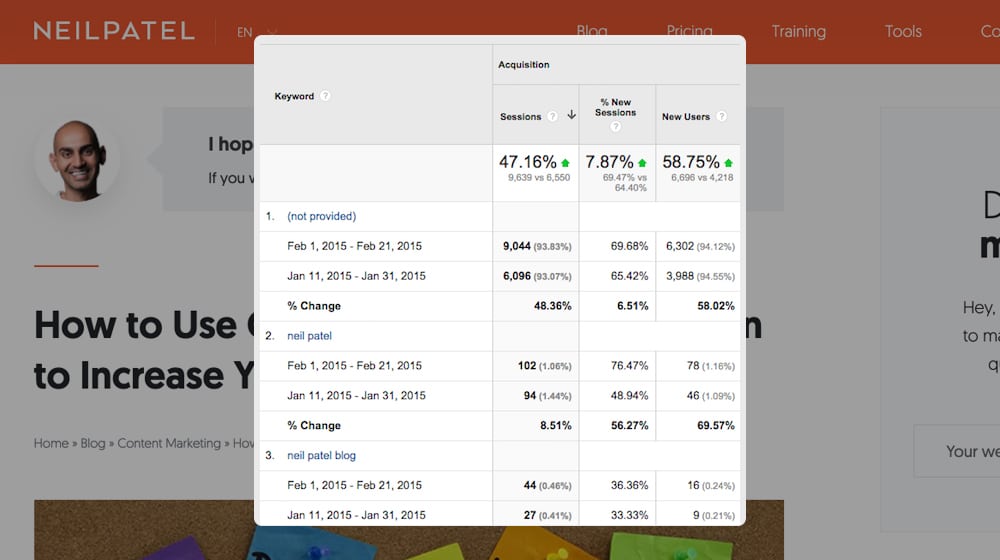
If you're anything like me, though, you might wonder what he's leaving out. I'll dig into that a bit later, but first, let's talk about how you might translate your content if you desire to do so.
First, we're going to cover the two primary ways to accomplish WordPress content translation.
 30 Second Summary
30 Second Summary
You need to think carefully before translating your website content into other languages. While tools like Google Translate can quickly convert your pages into 80+ languages, the translations are often poor quality and can hurt your SEO. You'll have duplicate content issues and risk Google penalties for auto-generated text. If you want to reach foreign markets, you should make sure you can actually serve those customers profitably first. Manual translation by fluent speakers will give you much better results than automatic tools, but you'll need to limit yourself to fewer languages.
Automatic vs Manual Translation
There are essentially two ways you can translate content on your website.
The first is the automatic method. There are a variety of different website plugins out there that give you a simple drop-down menu in the corner of your site, that allows users to change the language of the content automatically. For example, TranslatePress is one of the most popular and supports 221 languages with automatic translation support.
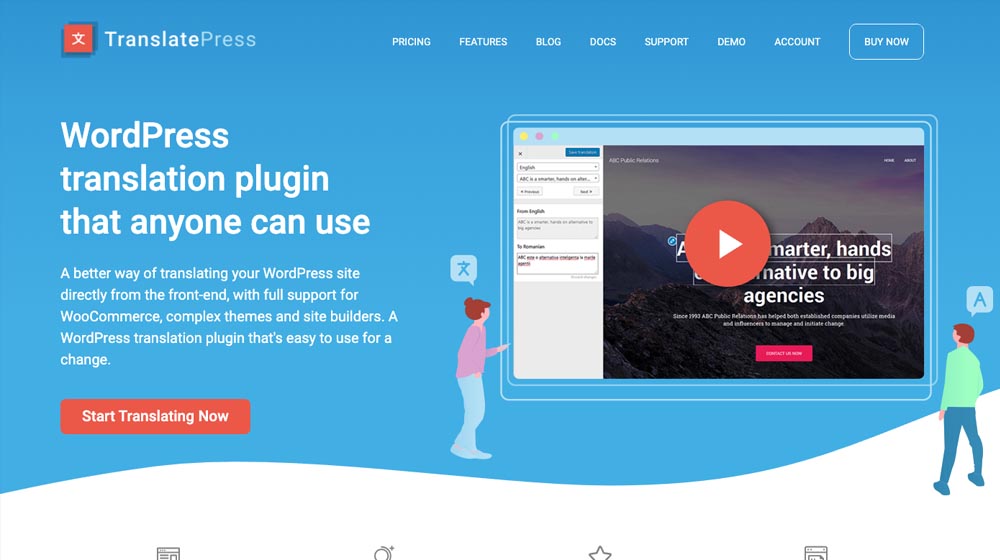
The content itself is translated by the plugin, running it through one of several different systems. These systems include:
Of these, typically Google Translate and DeepL are the most frequently used. They both have APIs that allow you to automatically translate content on-demand rather than needing to translate it at the time of publication, manually.
There are pros and cons to this method.
Pro: Translations using a plugin and an API are automatic. When a user wants content from your site in a different language, the plugin sends your page content to the API, gets it translated, and pulls it back for the user, in a matter of seconds.
Pro: You can serve more languages automatically than you can manually. With manual translation, you may have to pick the top 5 or so languages you want to support, or just do a bilingual site; with automatic translation, you can support 50-80 languages all at once.
Con: Machine translation is… not the best. We all know about the Engrish-style nonsense that comes from unchecked use of Google Translate. It's one thing to see it on the menu of a local Chinese restaurant or a sign in an airport. It's quite another for it to be representing your brand with your blog content and calls to action.
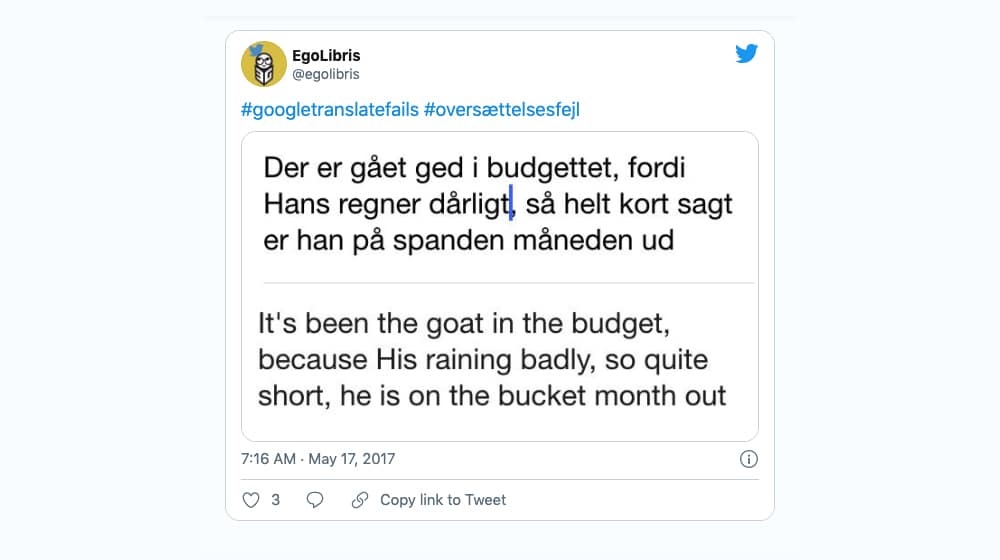
Google Translate claims to be better than it used to be, and Google has indeed put a lot of effort into it, but it's still far from perfect. You can still find people posting about the recent translation fails that they find online. DeepL is known to have a bit better accuracy, but it's still not perfect. You can try translating an image from a language other than your own into English, and you'll see that it's a bit off. Try one version on DeepL and one version on Google Translate, and chances are, both of them will read very differently.

Con: You might end up with SEO problems. You're opening up a new audience, yes, but you may end up with a lot of duplicate pages; the content is different, but the metadata doesn't get translated, for example. It depends on how the automatic system you're using works, but they're all generally optimized for serving content, not for SEO.
Manual translation, meanwhile, is much slower and more expensive. Naturally, you'll have to hire a person that is fluent in both languages to serve as a translator. When you write a blog post, send it to them to help you write a translated version in the second language.
Even the most advanced computer systems right now are not able to interpret the nuance of human communication, in any language. This is why there's always something off about machine-translated content. It's why you can always tell when something isn't quite right. It's also why some similar or synonymous words can lead to entirely different sentences, or even result in complete nonsense.
A human with language fluency will always produce a better translation, but they cost a lot more than access to a machine translation API. They take time, and they can only support one or two languages at most. They might also have a busy schedule and may not be able to dedicate their time to you as a sole client.
What Google Says
Google made Google Translate, so they would probably encourage you to use it, right?
Not quite.
The truth is, Google loves to make products that don't always work well together. They also love to make products that they then kill off later because they aren't widely used. There's a lot I could say about Google's mismanagement of many different products, but that's a rant for another time.
Google's search quality guidelines are almost explicit about it. Specifically, you need to look in their section about Automatically Generated Content.
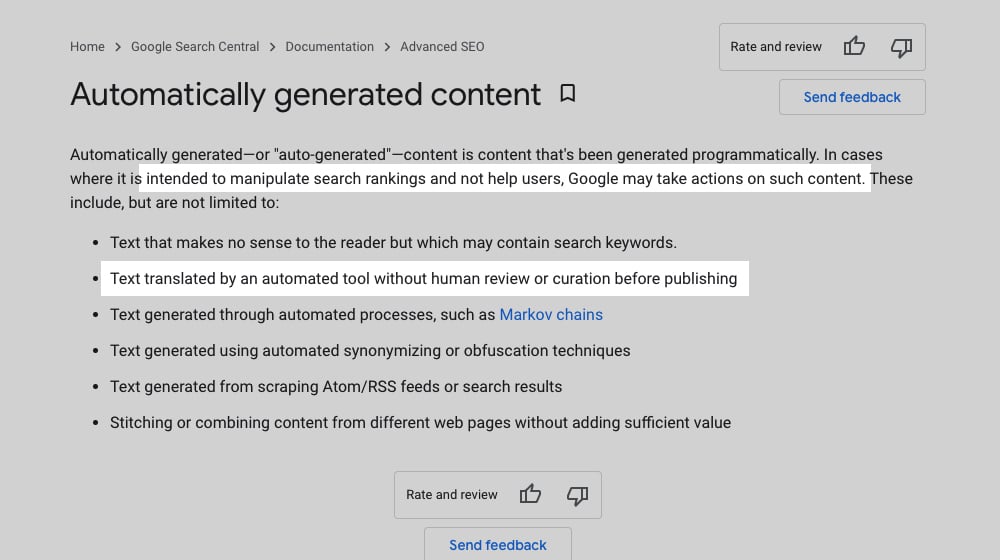
"Automatically generated—or "auto-generated"—content is content that's been generated programmatically. In cases where it is intended to manipulate search rankings and not help users, Google may take action on such content. These include, but are not limited to:
- Text that makes no sense to the reader but which may contain search keywords.
- Text translated by an automated tool without human review or curation before publishing
- Text generated through automated processes, such as Markov chains
- Text generated using automated synonymizing or obfuscation techniques
- Text generated from scraping Atom/RSS feeds or search results
- Stitching or combining content from different web pages without adding sufficient value"
See anything in particular that stands out? I do.
"Content that's been generated programmatically […] intended to manipulate search rankings and not help users."
What would automatically-translated content (especially in Neil Patel's sense of boosting indexed page count to target a broader audience) be, if not this?
"Text translated by an automated tool without human review or curation before publishing."
Any automatic translation plugin is going to provide on-the-fly translations, which by definition means there's no human overview for them.
Now, is Google going to penalize you for running a translation plugin? Probably not, at least not right away. It's always a possibility, though, so I'd be very careful about doing it.
If you can get a huge volume of new users with machine-translated content, and then leverage those users for business value, the SEO hit of using automated systems might be fine. Otherwise? I wouldn't.
The Issue of Value and Utility
Remember up at the top, I wanted to point out something Neil Patel left out of his blog post? It's something that a lot of other articles on the same subject leave out as well.
What did Neil say this plugin system got him? More traffic, more blog comments, higher click-through rates. And, sure, I can see it. When you open up a larger audience, you can get those things.
What doesn't he say he gets?
Sales. Profits. New clients.
Neil freely admits that he doesn't understand the languages he's targeting. He gets blog comments in languages he doesn't understand. If I implemented the same system, I would too.
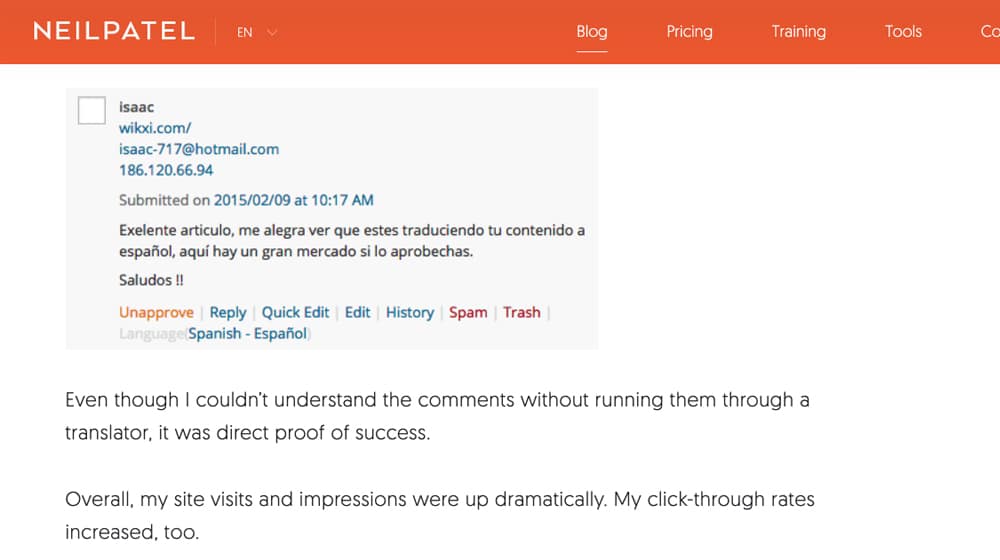
So what's the point? People can read his blog posts, but they can't do anything about it. He can't provide consulting services to someone who doesn't understand him. I can't write blog content for a business in a language I don't know.
This issue always comes up in overseas SEO as well. I can target people in Australia or Great Britain with my blog posts, and I can leverage them as customers if they want; even if there are colloquial differences and differences in spelling, it's still English. I'd have a much harder time targeting India or China.
For any company that sells actual products, I point out a similar issue. If you're targeting China with your blog posts, great! Can you ship to China? More importantly, can you ship to China profitably? Most people I ask this question can't.
Now, maybe Neil Patel can pick up clients in foreign languages. He's rich, he has a lot of resources, he can hire translators or hire professionals to do his job for him in those countries. He didn't write about the ROI of his content, though.
It's also interesting that, over the years, he's changed his approach. When he initially wrote that post I linked, he even included screenshots of his site with 80+ language support.
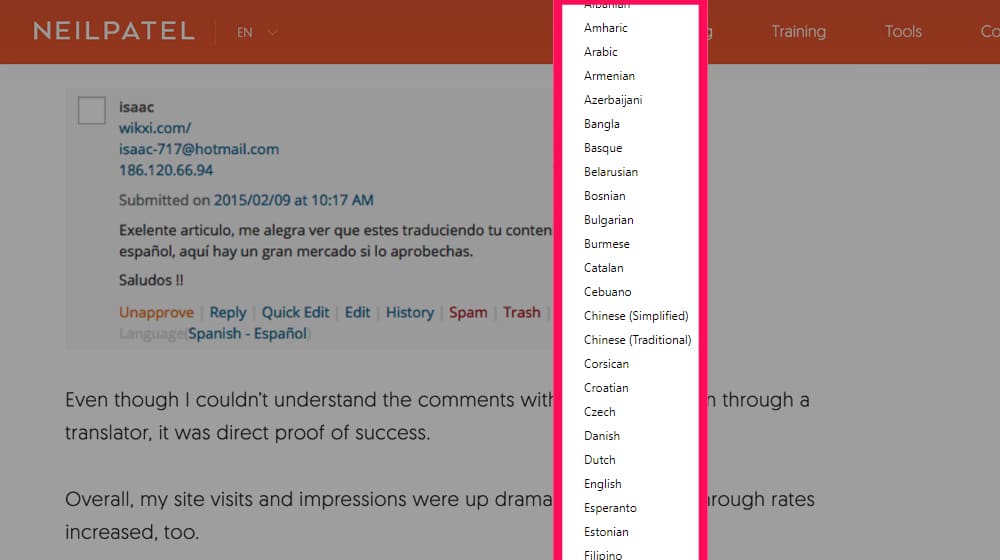
If you check his site now, his language drop-down only supports English, Portuguese, German, Spanish, and Italian. Where's the Armenian? Where's the Chinese? Where's the Hindi or Tamil? He mentions that the two biggest markets he could open up are China and India, but he doesn't support them.
Makes you think, doesn't it?
Should You Use Translated Content?
I want to be clear here. I'm not saying you shouldn't support translated content. I'm just saying that if you're going to, you need to have a good reason because there are some serious SEO risks to doing so. A local car company in Kansas City isn't going to get any benefit out of publishing their content in Chinese; even if they get a ton of viewers from China, they aren't going to be selling cars to them.
Before you consider translating your content, ask yourself what value you get out of doing so.
1. Do you have a local ethnic population you can reach? If your city has a sizable Chinese population, then sure, producing your content in a way that is readable in Chinese might be a good idea. Spanish is a common option as well, particularly in cities and states with large Hispanic populations. Certain cities throughout the country also have high levels of ethnic communities where providing content that is written in Hindi, Dutch, or Japanese can all be good ideas. Or, you can just look at Quebec, where bilingual English/French content is the norm.
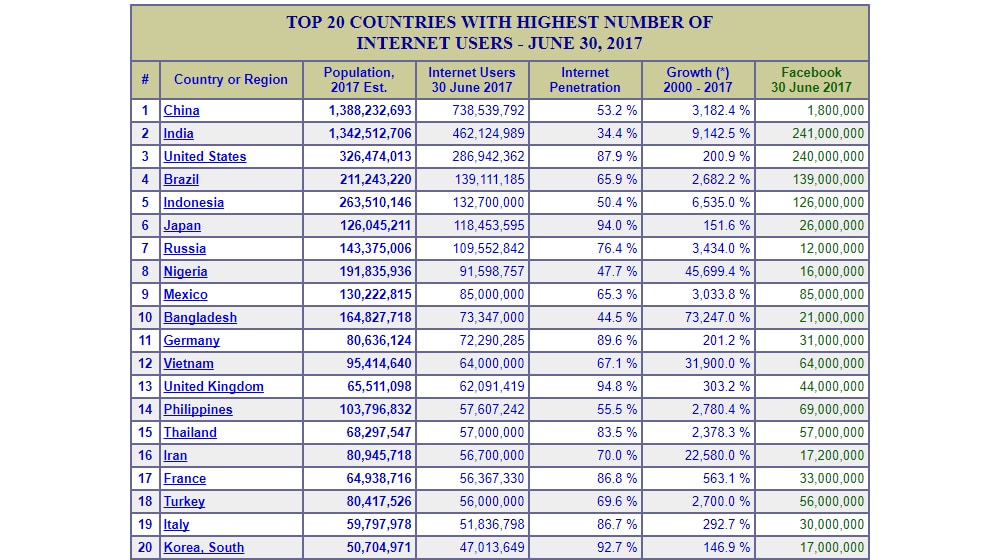
2. Do you have the ability to ship to or service foreign markets? I can write great blog posts in English, but if you asked me to write something for you in Spanish or Chinese or Korean or Hindi, I wouldn't be able to. I could, potentially, hire a translator to do it, but is it worthwhile to me? That's an additional expense, cutting into my ability to make money in the market. I also lose out on things like local aphorisms, colloquialisms, and customs. My writing wouldn't be very good at targeting a specific audience in a foreign language because I have very little way to understand, research, and connect with that audience.
For a company that ships products (or drop-ships them), it's an easier decision to make. Can you ship your products or offer your services to someone overseas without eliminating your profit margin? Sure, you can ship to China or India, but if the shipping costs and the delays are such that you don't make money doing it, why do it at all?
3. Is your content generically valuable enough that it's worth providing as a resource in another language? If you're writing tutorials, guides, or informative content, and you want to provide that content to people in other countries without worrying about selling products or making a profit, that's fine. I have nothing against that! In that case, though, you should probably avoid these automatic translation systems. You want your content to be high quality because your content represents your brand, and it's not possible to trust that these systems aren't producing gibberish. A manual translation is the best way to go, for sure.
Unless you have a tangible idea of how you're going to make a profit off of a foreign audience, I don't think it's worth setting up translations for your WordPress site. The chances of getting hit by an SEO penalty on your primary language content is just too high; it's too big of a risk.
Have you considered using a plugin to translate your WordPress pages? Have you already done it? What have your results been? We'd love to hear from you in the comments below, please share with us and let us know your thoughts!



 30 Second Summary
30 Second Summary



March 23, 2021
Google Translate hasn't even been close, I sent the article to a friend of mine who speaks Spanish and he said most of it sounded funny or used super formal words. I deleted it. I had a feeling it wouldn't be that easy but I would have thought their Spanish translations would be pretty good.
March 25, 2021
Hi Jay! I wouldn't recommend publishing an article that was automatically translated like this. You hit the nail on the head, the best way to publish translated content is to have it manually translated. Software is getting pretty close but you can tell that it's been translated, the final product just sounds off, especially with any lingo.
September 12, 2022
Oof yeah... I came across a similar article and it was not great. In general, Google Translate is only good for getting general context clues.